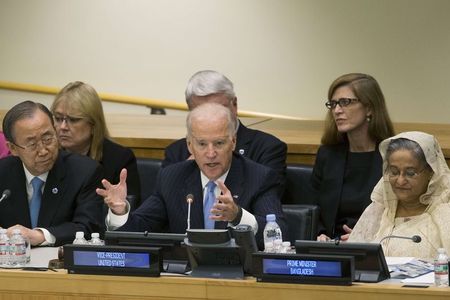By Louis Charbonneau and Michelle Nichols
UNITED NATIONS (Reuters) - The United States and countries that contribute troops to U.N. peacekeeping missions vowed on Friday to ensure that more soldiers, better training and additional resources are available for the "blue helmets" confronting new threats on changing battlefields.
The pledges came at a high-level meeting on United Nations peacekeeping on the sidelines of the U.N. General Assembly that was chaired by U.S. Vice President Joe Biden. Other leaders who participated included Rwandan President Paul Kagame, Japanese Prime Minister Shinzo Abe and Bangladesh's Prime Minister Sheikh Hasina.
"We meet at a moment when the demand for international peacekeeping has never been greater," Biden said. "In one generation, U.N. peacekeeping has grown tenfold, to about 120,000 men and women deployed around the world."
"As the nature of conflict and combatants has evolved to include sophisticated non-state actors as well as traditional armies, the instruments of peacekeeping have evolved as well."
An internal U.N. study in May found that U.N. peacekeeping missions routinely avoid using force to protect civilians who are under attack, intervening in only 20 percent of cases despite being authorized to do so by the U.N. Security Council.
The recent kidnapping and encirclement of Fijian and Filipino peacekeepers by Islamist militants in the Golan Heights on the Syrian side of the Syrian-Israeli border highlights the new type of threats peacekeepers can face on the battlefield.
Diplomats say that while some peacekeeping missions perform adequately, others have failed to protect civilians. They cite missions in Central African Republic, Sudan's western Darfur regions or its force in Democratic Republic of the Congo, which have raised concerns about the quality of blue-helmeted troops.
"In South Sudan, since the time that there was an expanded number of troops (approved by the U.N. Security Council), it's taken about 10 months for 50 percent of the additional troops to deploy, which is an agonizingly slow deployment in a critical situation," a U.S. official told Reuters, speaking on condition of anonymity.
Often underfunded, underequipped and undertrained, U.N. troops are now deployed in more live conflict zones than ever before.
"Two-thirds of peacekeepers now serve in active conflicts, which is more than at any time in history," the U.S. official said.
But countries contributing troops and funds to peacekeeping want this to change.
There were a number of announcements of concrete help during Friday's meeting.
Mexico said it would resume sending troops for peacekeeping missions after decades of not doing so. Rwandan President Kagame offered helicopters and a police unit for South Sudan, while other major troop contributors like India, Pakistan and Bangladesh announced that they, too, would commit more resources and training to help improve U.N. troops' prowess.

The top 10 contributors to the U.N.'s almost $8 billion a year peacekeeping budget are the United States, which contributes 28 percent of the budget, Japan, France, Germany, United Kingdom, China, Italy, Russia, Canada and Spain. The biggest troop contributors are India, Bangladesh, Pakistan, Ethiopia, and Rwanda.
(Editing by Jonathan Oatis)
